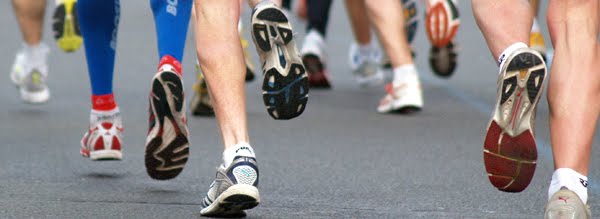Sore a day or two after training or a race? Victor and personal trainer Thad the "RunnerDude" from NC says, don't blame Lactate.
So why do you get it?
"DOMS—Delayed Onset Muscle Soreness...we've all had it and we all hate it, but it's a necessary evil in your pursuit for a fitter stronger body. Whether you're a swimmer, a runner, a cyclist, a gym rat, or a combination of them all, you've experienced DOMS. You don't have to be a newbie to fitness to experience DOMS. Anytime you expose your body to new or more intense demands you're more than likely going to experience muscle soreness a day or two after the workout.
Lactate (a by-product of intense exercise) is often blamed for the muscle soreness, but lactate is not the culprit. Lactate actually isn't the bad guy it's often portrayed to be. A trained athlete can actually use lactate as an energy source. When an athlete pushes him/herself past his/her lactate threshold (such as in an interval workout), the body can no longer clear the lactate fast enough so it builds up and can cause that burning sensation in the muscles eventually fatiguing the muscles causing you to slow down. But if you've ever experienced that burn in an interval workout, you also know that if you slow it back down or stop and walk it off, that burn will eventually subside because the body pretty quickly is able to recoup and clear the excess lactate (usually within 30 minutes). DOMS, however, doesn't happen until the next day or sometimes not even until 2 or 3 days later. So, Lactate, you're off the hook.
If it's not lactate buildup, then what's the cause of DOMS? If you're a runner, you can probably pin point two types of workouts that might result in DOMS—short fast workouts such as intervals or hillwork and very long slow runs. Downhill running seems to cause the most intense DOMS. Whenever you up-the-ante with duration or intensity, you're putting your muscles under more stress. You're actually causing microscopic damage to the tiny myofibrils that make up the muscle fibers. Don't worry. I know that sounds bad, but it's not. This is actually how muscle becomes stronger. The pain you're feeling the next day or so, is the result of that microscopic muscle damage. But during this time the body sends in the troops and begins to repair the damage. It's this repair process that actually makes the muscle stronger. Because the muscle will be stronger, the next time you apply the same stress that caused the initial DOMS, your muscles will be able to handle the workout and most likely you'll not experience DOMS. That's called adaptation. Your body has now adapted to the intensity level.
Because your body is an expert at adaptation, it's very important to always mix up your running routine. Have you ever heard someone say, "I run every day, but I can't seem to get any faster. I'm even gaining a little weight." If you dig a littler deeper into this person's running regimen, you'll probably discover that he may have the mileage, but he's running the same distance and the same intensity every time he runs. His body has adapted to this and so he's stagnated. In order to get out of this slump, he needs to mix-it-up by throwing in a tempo run, add some fartleks to a regular run, or add a day of speed work each week such as intervals or hill repeats."
Now these folkss have some serious DOMS!
Watch and chuckle, we've all been there...(watch till end, too funny!)
Subscribe to:
Post Comments (Atom)


No comments:
Post a Comment